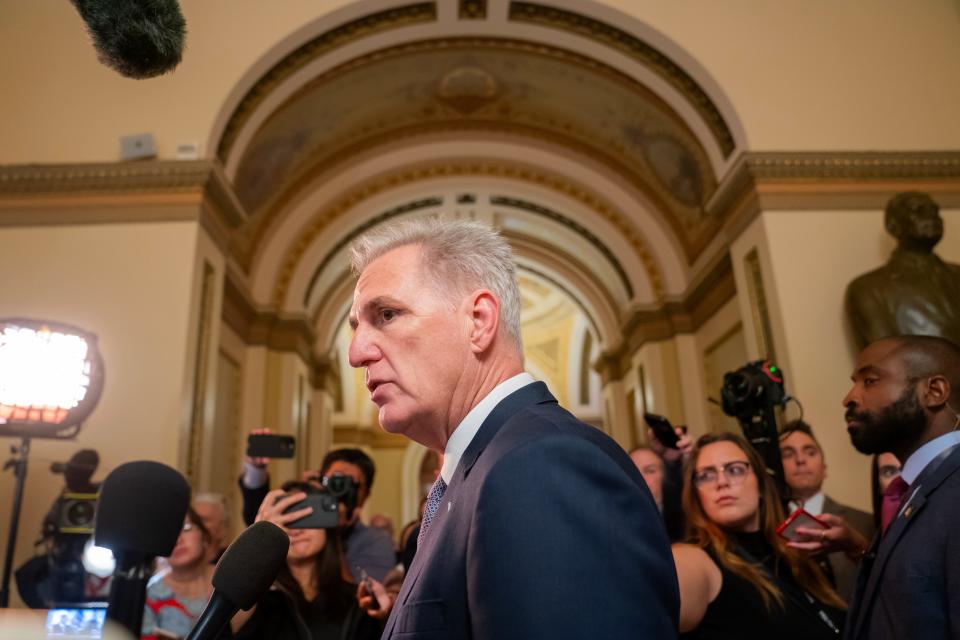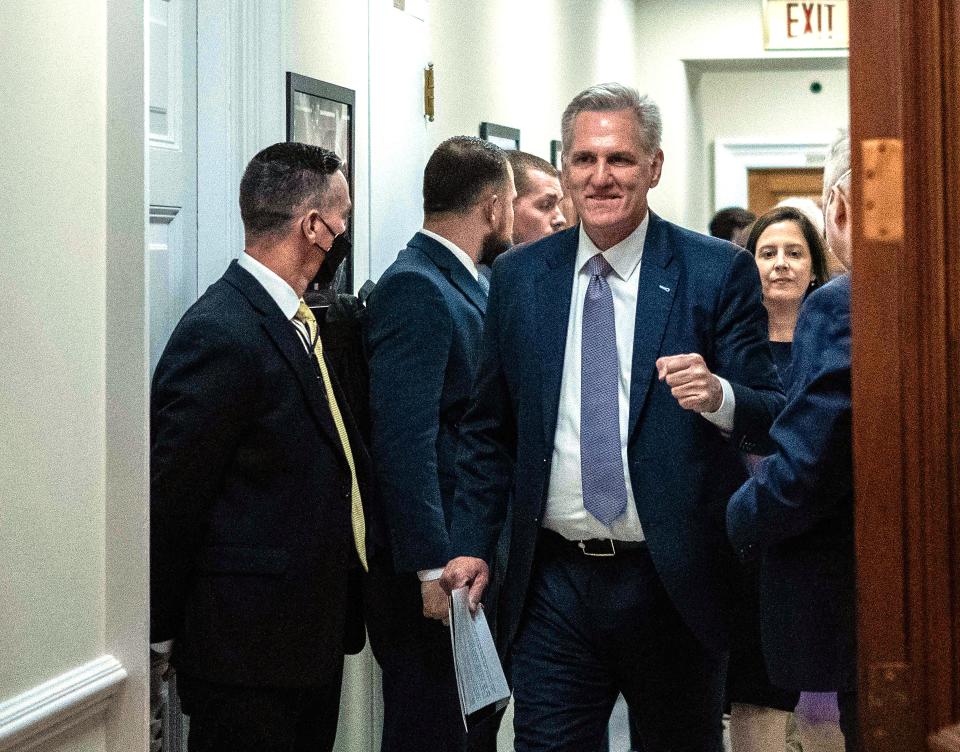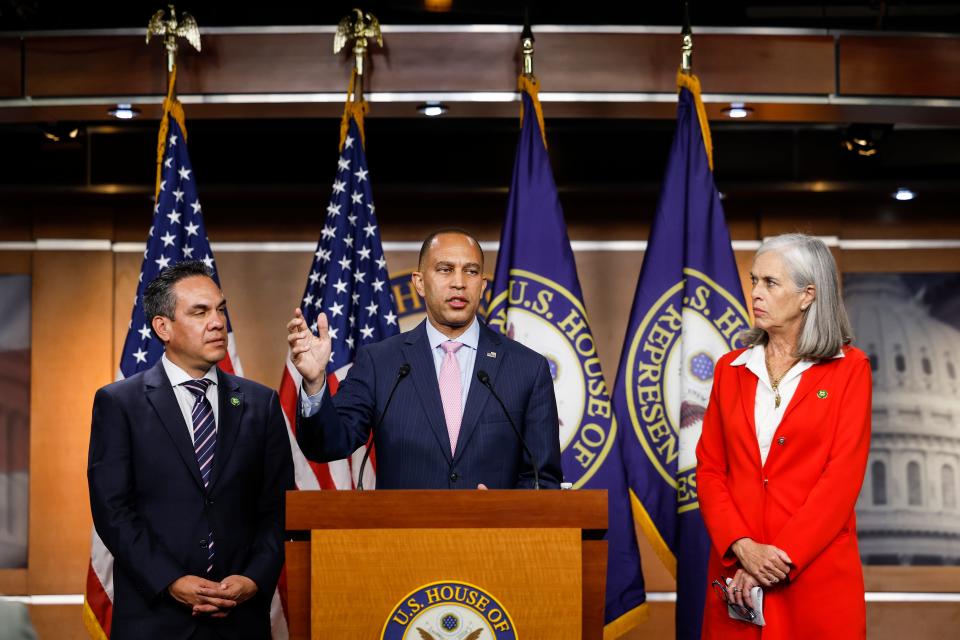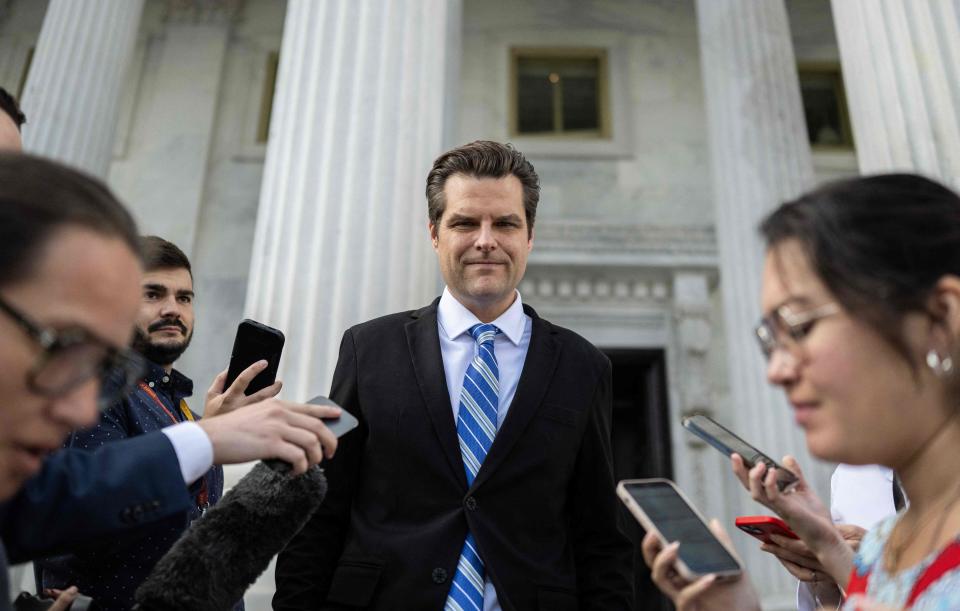Congress dodged a government shutdown. Here are the winners and losers from a messy fight.
- Oops!Something went wrong.Please try again later.
WASHINGTON – Congress successfully averted a government shutdown on Saturday in a shocking twist, after lawmakers made no progress on keeping the government's doors open for weeks on end.
Their temporary deal, referred to as a continuing resolution, keeps government funding at current levels until Nov. 17. The legislation kicks the can down the road while lawmakers try to negotiate a longer-term solution.
But in the meantime, Americans can be relieved for the moment without a potential shutdown looming over the country, which could have furloughed hundreds of thousands of federal employees, delayed food assistance programs and more.
But while the continuing resolution received overwhelming bipartisan support in both the House and Senate, it didn’t leave everyone happy.
Here are the winners and losers from a chaotic weekend in Washington:
The last-ditch deal: Dodging a government shutdown was a stunner. Could it also be an omen?

Winners
Millions of Americans
As the country barreled toward Sept. 30 – the expiration date for government funding – a shutdown looked all but certain as House Republicans were engulfed in a bitter intraparty conflict.
Conservative hardliners demanded spending cuts that had zero chance of passing in the Democratic-controlled Senate and weren’t palatable for some moderate GOP lawmakers.
But with government funding extended, millions of Americans, including federal workers and families who rely on government benefits, can breathe a sigh of relief.
If a shutdown did occur, federal workers deemed nonessential would be furloughed. Those deemed essential would have to work without pay, receiving backpay after the shutdown ended.
The Special Supplemental Nutrition Program for Women, Infants and Children – known as WIC – would have paused in the event of a shutdown, endangering access to healthy food and baby formula for low-income pregnant women, breastfeeding women and children under the age of 5. With a shutdown averted for now, those families who rely on the program will continue receiving support from the major social safety net.
The in-betweens
House Speaker Kevin McCarthy
House Speaker Kevin McCarthy, R-Calif., took a victory lap following the stopgap’s passage in the House and went after the critics who doubted whether he could avoid a government shutdown.
The California Republican has made it a habit to chide reporters for doubting him through multiple crises and tough votes, such as intense negotiations to raise the debt ceiling and pass the annual defense policy bill earlier this year.
But the deal to keep the government open still has its negatives for McCarthy, who now faces an immediate threat from conservative hard-liner Rep. Matt Gaetz, R-Fla., and other hard-right allies to oust him from the speakership.
Gaetz, leading up to the temporary deal, warned he would file what is known as a "motion to vacate" to attempt to remove McCarthy from his post if the speaker worked with Democrats to avoid a shutdown. After the stopgap deal, which received more Democratic support than Republican support in the House, passed, Gaetz announced his plans to challenge McCarthy Sunday morning.
"That's nothing new. He's tried to do that from the moment I ran for office," McCarthy said on CBS' "Face the Nation" after Gaetz vowed to try to remove him from his leadership position. "This is personal with Matt."
Leading up to the Saturday funding deadline, McCarthy also insisted on trying to pass a party-line package solely supported by GOP lawmakers and hesitated to work with Democrats to avert a shutdown. But as a shutdown inched closer and closer, the speaker relented and made a significant shift in strategy that Democrats have spun as their victory.

House Democrats
As House Republicans made no progress toward averting a shutdown for weeks, House Democrats repeatedly urged McCarthy to put forth a “clean” continuing resolution with no spending cuts to avert a shutdown.
After the House passed that clean, but temporary, deal on Saturday, Democratic lawmakers claimed victory for avoiding the shutdown and suggested they forced McCarthy’s hand.
“I think we won,” Rep. Jim McGovern, D-Mass., told reporters before voting for the continuing resolution.
House Minority Whip, Rep. Katherine Clark, D-Mass., said McCarthy “admitted defeat,” when he put the measure on the floor.
McCarthy "asked Democrats to put out the fire that he and his party had started,” Clark said at a press conference Saturday.
But House Democrats didn't get everything they wanted. They were also insistent on including additional U.S. aid to Ukraine in the deal, and when McCarthy put the clean stopgap on the floor hours away from a shutdown, Democratic lawmakers ultimately ended up supporting the bill to keep the government open, even if it meant punting Ukraine aid to a separate vote.

Losers
Matt Gaetz and the hard right
Hard-line conservatives have impeded McCarthy’s attempts to avert a shutdown every step of the way. They tanked traditionally procedural votes for long-term spending bills and sank a short-term deal to keep the government open in an open rebellion against McCarthy's leadership.
That short-term deal, which included a slate of conservative spending cuts, was not amicable enough to ultraconservatives, who voted against the bill in what was a temporary blow to McCarthy’s efforts to dodge a shutdown.
Some of those hard-right lawmakers, such as Rep. Matt Rosendale, R-Mont, refused to support essentially any continuing resolution.
Rosendale, along with some of his conservative colleagues, said they were okay with a government shutdown if it meant Congress would focus on passing the long-term spending bills. The Montana conservative in particular has downplayed a shutdown as a “government slowdown.”
But after passing on the opportunity to approve a conservative funding deal, the hard-liners caused McCarthy to push through a stopgap with no spending cuts at all and work with Democrats, sidestepping the ultraconservatives.
In the face of Gaetz’s threats to oust McCarthy, the speaker welcomed the challenge and effectively called his bluff.
“I’ll survive,” McCarthy said on CBS’ “Face the Nation.” “Bring it on. Let's get over with it and let's start governing.”

Ukraine aid
The "clean" continuing resolution noticeably omits President Joe Biden’s request for additional U.S. aid to Ukraine, which has bipartisan support.
McCarthy, who has had to placate all corners of his conference, left Ukraine funding out of the continuing resolution in a win for some opponents to funding the Ukraine war effort.
Enmity toward U.S. aid to Ukraine among House Republicans has appeared to grow as the war drags on. Nearly half of House Republicans voted to strip $300 million in Ukraine aid from an annual defense spending bill last week.
The funding deal hit a slight snag in the Senate when Sen. Michael Bennet., D-Colo., held up the chamber’s vote due to the lack of Ukraine funding. Bennet sought a commitment from leaders to continue backing the war effort, to which they eventually agreed and released a bipartisan joint statement supporting Ukraine.
“In the coming weeks, we expect the Senate will work to ensure the U.S. government continues to provide critical and sustained security and economic support for Ukraine,” the statement read.
While Congress will likely hold a separate vote on Biden’s supplemental request, the lack of aid in the continuing resolution is a sign of wavering support for the war effort.

This article originally appeared on USA TODAY: McCarthy, Gaetz: Winners and losers from government shutdown fight

